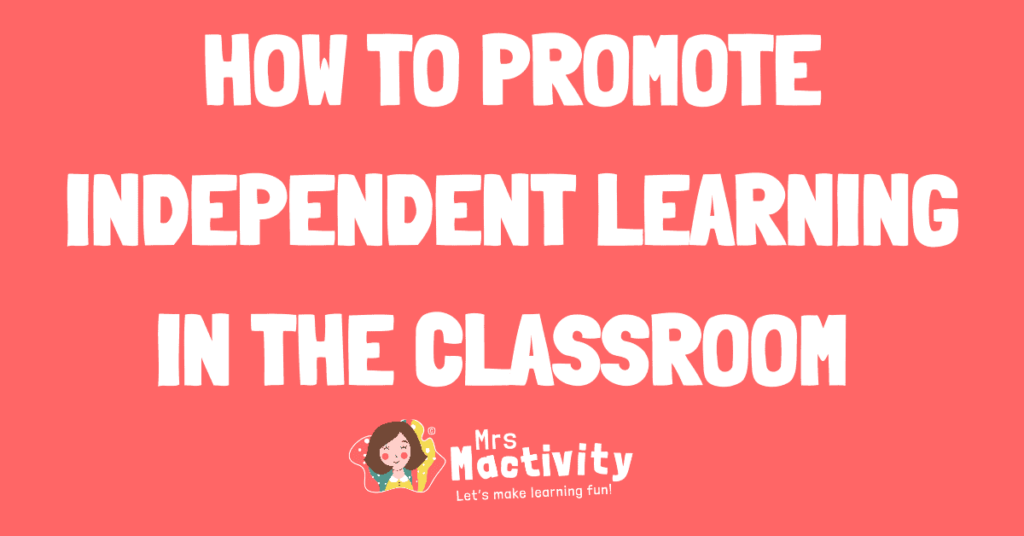This is a blog post written by experienced teacher Lucy. Lucy is a content creator for Mrs Mactivity and has been working on our return to school assessments – helping teachers figure out where the gaps are in children’s learning from their previous year group after missing so much school during lockdown.
When your new class returns in September one of the tasks high on your to-do list (aside from the recovery curriculum) will undoubtedly be undertaking some assessments to work out where the gaps in knowledge are from the previous year’s curriculum. You can explore our post lockdown assessing the gaps documents here.

In order to achieve this successfully you may need some time working one-to-one with a child while the others work independently. This will require some independent learning and focus from the other children to allow you to concentrate properly on each individual child. The question is – how can you encourage independent learning from the other children? Read on for our top tips…
- Allow choice. Even if the choices the children make are ones you have carefully selected for them, if the children perceive that they have an element of control over their learning they are more likely to engage in it. An example of how to do this is using ‘challenge cards’ where children can select their own appropriate task.
- Encourage peer support. Training children to ask their peers before asking an adult for help is a useful strategy. Some schools use catchphrases like ‘three before me’ where children are encouraged to try asking three peers for help before approaching an adult for support. This can also help boost the confidence of shy children if they are approached for help and they are able to successfully offer it. It’s also a brilliant way for the children who are asked to consolidate their own learning – after all they do say that the best way to learn something is to teach it to someone else!
- Let the children take ownership of their learning. This is seen in lots of classrooms at the beginning of a topic when you have the ‘what would you like to learn about ____’ discussion. However, it can be taken much further than that. One strategy is starting sessions with an independent element by asking the children to pose a question for themselves they would like to have found the answer to by the end of the lesson to help focus their research or investigations. In addition, letting them present their findings to a group or the whole class gives them a purpose and audience which are two key elements in engaging children with any type of learning.
- Let the children help plan independent activities. Discuss with them the ways they learn best. Research has shown that the majority of teachers are visual learners and there is a predisposition for us to plan activities that support our learning style. You may find your class has a lot of children who are kinaesthetic learners or auditory learners who may be more successful at staying on task independently if their learning style is catered for. (Though other people say that we are all a mixture of these learning styles).
- Encourage reflection. A big part of learning is reflecting on what you have learnt, created or shared with others. This reflection lends itself well to independent learning as minimal input is needed for a child to do this as they have already had the input to create the piece of work in the first place. Strategies for this could include asking other children to fill in a ‘two stars and wish’ proforma as they listen to a child share their work and then asking the child to review and consider these when trying to improve. For younger children, reflection could be as simple as using a different coloured pen/pencil to check their work for capital letters and full stops. Peer editing is really powerful but does require some training first so that children don’t end up getting upset.
- Develop time management skills. Encouraging your class to be aware of time constraints for tasks will help them be more productive in the time allocated and ensure that your time is spent supporting those in need of help rather than issuing reminders about the amount of time remaining to complete a task. Start the year by setting up clear routines around independent task time, for example using a countdown timer on the board so they can see how much time they have left. Also children need to know what will happen if they don’t complete the expected amount of work that was required within the session, for example will they have to complete it at a later time? Take it home? Do it during playtime?
- Explicitly teach the skills needed for creating creative, critical thinkers. Build time into your curriculum for tasks that develop team building, ingenuity, discussion and evaluation in order to succeed. If children can work out how to solve their own problems during these kind of tasks they will be more successful when applying these skills to everyday learning.
- Reward the skills you want to see rather than the end product. Not every child in your class will be able to write a brilliant story independently or build a model using recycled scrap items on their own. However, every child has the capacity to demonstrate perseverance, empathy, support for others, patience and resilience. The more you notice and reward these skills, the more incentivised your class will be to display them. Just like any good Early Years teacher knows, it is the process not the finished product which is the biggest indicator of learning.
- Learn to step back. Thinking of yourself as a facilitator of learning rather than the one who has to impart the learning on your class full of impressionable minds is the first step. You should not be the hardest working person in the room, performing at the front of the class as if it was a stage desperately trying to maintain their attention and focus. The ideal that we are all working towards is the children being the driving force for learning, being so enthused by a topic that they are desperate to know more. Although in practice it may not always be achievable there will be times where the children’s desire to learn is the momentum that others need to engage them, so letting children motivate others with their enthusiasm for a topic is beneficial.
- Teach the skills of life long learning. Read up on metacognition and how to develop it. In summary you are teaching the children to think about how they learn best and apply that to the tasks they are given. As children develop their learning skills they will become more aware of the tasks they find easy and difficult and know when and how to ask for help. Being confident in making mistakes as part of the learning process and acknowledging the need for help are skills which will see them do well as they develop into adult learners.
- Have clear expectations about prior learning. When introducing new ideas or tasks there will usually be an element of previous learning required in order to move the learning forward. For some children this will not be an issue as they will just be building on previous learning they have already felt confident about. For other children they may feel they are less than confident about the prior learning that is required in order to progress. Teaching your children that acknowledging these gaps in prior learning is part of the new learning process is key. In practical terms this could mean than in order to complete Tuesday’s maths lesson the children need to have understood the content from Monday. If they haven’t understood it on Monday they could have left a note in their book, mentioned it at the end of the lesson or gone away and discussed it at home in order to practise the concept more. Addressing the gaps is key. The expectations may be that they look at the working wall for that week, discuss it with a peer or acknowledge they have found it difficult and ask an adult for help which will help move them forward in their learning more quickly.
- Share with the children what will make them successful in their task. Particularly for younger children they can often fall into the trap of thinking that producing a great quantity of work will be celebrated when really as the teacher you are looking for much less quantity in favour of higher quality. Many children respond to having them own (usually differentiated by ability) checklist for a task that they can ‘tick off’ items on as they work and at the end when they are reviewing. If they already know how they will be successful at the start of the lesson, then you are setting them up to do well.
- Let children take responsibility for checking their work. Sometimes providing the answers so children can check their own work can help develop independent learning skills. In the classroom this might look like setting some calculations to complete, displaying a timer for 5 minutes then after 5 minutes displaying the answers for the first few questions. Allowing the children to check their work after a relatively small amount of independent time either empowers them as they have the positive reassurance they have understood the method and can continue to be successful, or gives them the opportunity to rectify any misconceptions in order to avoid a page full of mistakes at the end of the lesson.
- Make it clear that you are not to be disturbed. If you are doing a focus task, either working with groups or individuals, then let children know you are not to be disturbed unless it’s an emergency. Some teachers wear a crown or something similar to make this super clear!
Independent learning not only helps children to get set up for lifelong learning, it makes your job as a teacher more pleasurable and effective as you can focus on moving learning along for groups or individuals. What are your top tips for encouraging independent learning in children?







